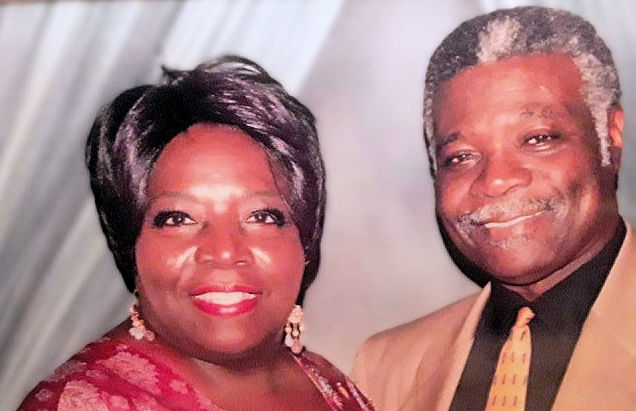Mississippi Today
Marker honoring Fannie Lou Hamer set for unveiling in husband’s hometown

Marker honoring Fannie Lou Hamer set for unveiling in husband's hometown
The life and work of civil rights activist Fannie Lou Hamer is being commemorated with a historical marker to be unveiled Saturday in Kilmichael, her husband's hometown.
The ceremony will be at 11 a.m. at 311 N. Depot Ave. in the heart of downtown Kilmichael in Montgomery County. Leslie Burl McLemore, who worked alongside Hamer with the Student Nonviolent Coordinating Committee and the Mississippi Freedom Democratic Party, is the guest speaker.
Fannie Lou Hamer often said she was born in Montgomery County, but testified in federal court in 1963 that she was born in Tomnolen in Webster County, which borders Montgomery County.

Montgomery County native Chris Snell and her husband, Wiley, a retired high school administrator from Fort Lauderdale, Florida, raised the funding and worked with Jim Woodrick and the Mississippi Department of Archives and History for two years in their effort to preserve the Hamers' legacy with the marker.
“This marker is a reminder that we are in this space because Fannie Lou Hamer fought and gave her life so that future generations can continue their thrust for excellence by lifting up their voices as she did,” Chris Snell said in a news release announcing the unveiling.
Additional funding for the event was provided by the Kappas of Rust College and the Zetas as part of their outreach activities.
Hamer's last surviving child, Jacqueline Hamer Flakes had been asked to be the guest speaker, but declined due to failing health. She died on March 27.
“We don't concentrate enough on how brilliant Fannie Lou Hamer was and her ability to adapt to her new environment — and her new environment was in the civil rights movement,” McLemore said in the news release.
She went from from being a timekeeper on the Marlow Plantation in Sunflower County to becoming SNCC's chief fundraiser, noted McLemore, professor emeritus of political science at Jackson State University, was the founding director of the Fannie Lou Hamer National Institute on Citizenship and Democracyat JSU in 1997.
This will be the second marker in Montgomery County that acknowledges Hamer's efforts for racial equity. The first was unveiled on June 9, 2022, in Winona at the site of the former jail where Hamer and several other activists were beaten in June 1963. A third marker, as part of the Mississippi Civil Rights Trail, will be unveiled on June 9, 2023, at the site of Staley's Café/Trailways Depot where Hamer and the others were arrested prior to the jailhouse beating.
This article first appeared on Mississippi Today and is republished here under a Creative Commons license.
Mississippi Today
On this day in 1892
MAY 21, 1892

Crusading journalist Ida B. Wells published a column exposing the lynchings of African-American men and denouncing claims that the lynchings were meant to protect white women.
Her anti-lynching campaign came after a mob killed three of her friends, who had reportedly opened a grocery store that competed with a white-owned store in Memphis.
Upset by Wells' writings, a white mob destroyed her presses and threatened to kill her if she ever published again. She left Memphis for Chicago, but she continued to expose lynchings, calling for national legislation to make lynching a crime.
In 1898, she took her protest to the White House.
“Nowhere in the civilized world save the United States of America do men, possessing all civil and political power, go out in bands of 50 and 5,000 to hunt down, shoot, hang or burn to death a single individual, unarmed and absolutely powerless,” she wrote. “We refuse to believe this country, so powerful to defend its citizens abroad, is unable to protect its citizens at home.”
The National Memorial for Peace and Justice in Montgomery, which opened in 2018, features a reflection space in honor of her.
Congress finally passed an anti-lyncing law in the 2021-22 session. The Emmett Till Antilynching Act defines lynching as a federal hate crime.
This article first appeared on Mississippi Today and is republished here under a Creative Commons license.
Mississippi Today
On this day in 1961
MAY 20, 1961

A white mob of more than 300, including Klansmen, attacked Freedom Riders at the Greyhound Bus Station in Montgomery, Alabama. Future Congressman John Lewis was among them.
“An angry mob came out of nowhere, hundreds of people, with bricks and balls, chains,” Lewis recalled.
After beating on the riders, the mob turned on reporters and then Justice Department official John Seigenthaler, who was beaten unconscious and left in the street after helping two riders.
“Then they turned on my colleagues and started beating us and beat us so severely, we were left bloodied and unconscious in the streets of Montgomery,” Lewis recalled.
As the mob headed his way, Freedom Rider James Zwerg said he asked for God to be with him, and “I felt absolutely surrounded by love. I knew that whether I lived or died, I was going to be OK.”
The mob beat him so badly that his suit was soaked in blood.
“There was nothing particularly heroic in what I did,” he said. “If you want to talk about heroism, consider the Black man who probably saved my life. This man in coveralls, just off of work, happened to walk by as my beating was going on and said ‘Stop beating that kid. If you want to beat someone, beat me.' And they did. He was still unconscious when I left the hospital.”
To quell the violence, Attorney General Robert Kennedy sent in 450 federal marshals.
This article first appeared on Mississippi Today and is republished here under a Creative Commons license.
Mississippi Today
Podcast: The controversial day that Robert Kennedy came to the University of Mississippi
Retired U.S. Bankruptcy Judge Edward Ellington talks with Mississippi Today's Bobby Harrison and Geoff Pender about former U.S. Attorney General Robert Kennedy's speech at the University of Mississippi less than four years after the riots that occurred after the integration of the school. Ellington, who at the time headed the Ole Miss Speaker's Bureau as a law school student, recalls the controversy leading up to the speech.
This article first appeared on Mississippi Today and is republished here under a Creative Commons license.
-
Our Mississippi Home7 days ago
Beat the Heat with Mississippi’s Best Waterparks
-
SuperTalk FM4 days ago
State auditor cracking down on Mississippians receiving unemployment benefits
-
Mississippi News Video6 days ago
Jackson has a gang problem
-
Local News3 days ago
Family files lawsuit after teen’s suicide in Harrison County Jail
-
Mississippi Today5 days ago
On this day in 1950
-
228Sports6 days ago
George County Pours Runs In 6A South State Title Victory At PRC
-
Local News Video6 days ago
In the Kitchen with J's Restaurant
-
Mississippi Business4 days ago
Connor Industries locating operations in Coahoma County












































